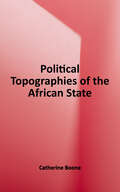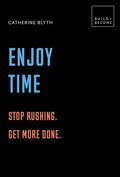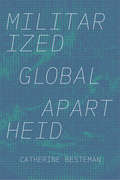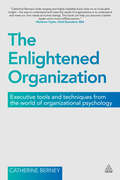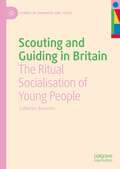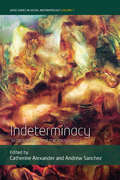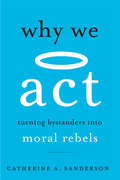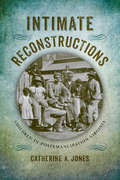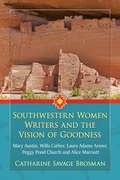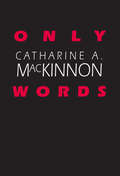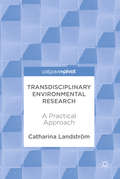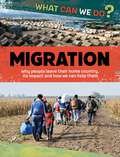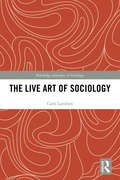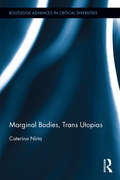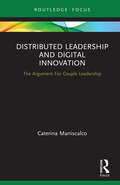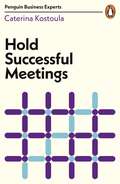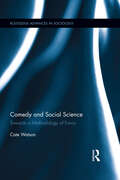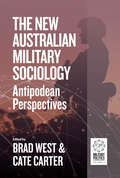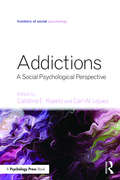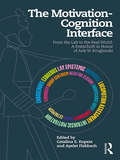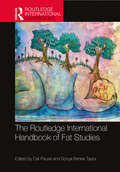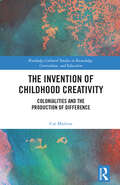- Table View
- List View
Political Topographies of the African State: Territorial Authority and Institutional Choice
by Catherine BooneThis 2003 study brings Africa into the mainstream of studies of state-formation in agrarian societies. Territorial integration is the challenge: institutional linkages and political deals that bind center and periphery are the solutions. In African countries, as in territorially diverse states around the world, rulers at the center are forced to bargain with regional elites to establish stable mechanisms of rule and taxation. Variation in regional forms of social organization make for differences in the interests and political strength of regional leaders who seek to maintain or enhance their power vis-à-vis their followers and subjects, and also vis-à-vis the center. The uneven political topography of the regions ultimately produces unevenness in the patterns and depth of center-region linkage. Six sub-regions of three West African countries - Senegal, Cote d'Ivoire, and Ghana - are the backbone of the study.
Enjoy Time: Stop Rushing. Get More Done. (Build + Become)
by Catherine BlythGain a better understanding of the nature of time and learn how to manage your time and improve your life.We are living longer than ever and, thanks to technology, we are able to accomplish so much more. So why do we feel time poor? In twenty eye-opening lessons, Catherine Blyth combines cutting-edge science and psychology to show why time runs away from you, then provides the tools to get it back.Learn why the clock speeds up just when you wish it would go slow, how your tempo can be manipulated and why we all misuse and miscalculate time. But you can beat the time thieves. Reset your body clock, refurbish your routine, harness momentum and slow down. Not only will time be more enjoyable, but you really will get more done.
Militarized Global Apartheid (Global Insecurities)
by Catherine BestemanIn Militarized Global Apartheid Catherine Besteman offers a sweeping theorization of the ways in which countries from the global north are reproducing South Africa's apartheid system on a worldwide scale to control the mobility and labor of people from the global south. Exploring the different manifestations of global apartheid, Besteman traces how militarization and securitization reconfigure older forms of white supremacy and deploy them in new contexts to maintain this racialized global order. Whether using the language of security, military intervention, surveillance technologies, or detention centers and other forms of incarceration, these projects reinforce and consolidate the global north's political and economic interests at the expense of the poor, migrants, refugees, Indigenous populations, and people of color. By drawing out how this new form of apartheid functions and pointing to areas of resistance, Besteman opens up new space to theorize potential sources of liberatory politics.
The Enlightened Organization
by Catherine BerneyThe Enlightened Organization is concerned with the organization and its responsibility for enabling success by putting in place processes (including leadership and communication) that will enable it to thrive and grow. More specifically, it addresses the role the individual leader can play in building an enlightened organization, providing specific tools and techniques that executives can use to see more clearly into the heart of what matters in any given business situation; to learn to use their values, passions and beliefs as a powerful resource in the workplace; and to create authentic dialogue within the organization. Author Catherine Berney is an expert in organizational psychology: she draws upon this background to explore the business context of complexity and change and to present the models that can help organizations respond proactively in the current operating environment.
Scouting and Guiding in Britain: The Ritual Socialisation of Young People (Studies in Childhood and Youth)
by Catherine BannisterThis book explores the prevailing role of rites of passage, ritual, and ceremony in contemporary children’s lives through the lens of modern-day incarnations of uniformed youth movements. It focuses on the socialising ritual and customary practices of present-day grass-roots Scout and Guide groups, asking how Britain’s largest and best-known uniformed youth organisations employ ritualised activities to express their values to their young members through language and gesture, story and song, dress, and physical artifacts. The author shows that these practices exist against a backdrop of culturally-constructed beliefs about what constitutes the ‘good child’ and ‘good childhood’ in twenty-first century Britain, with in-movement practices intended to help children develop positively and prepare for social life. The book draws on case study accounts of group performances, incorporating the voices of children and adults reflecting on their practices and experiences.
Indeterminacy: Waste, Value, and the Imagination (WYSE Series in Social Anthropology #7)
by Catherine Alexander Andrew SanchezWhat happens to people, places and objects that do not fit the ordering regimes and progressive narratives of modernity? Conventional understandings imply that progress leaves such things behind, and excludes them as though they were valueless waste. This volume uses the concept of indeterminacy to explore how conditions of exclusion and abandonment may give rise to new values, as well as to states of despair and alienation. Drawing upon ethnographic research about a wide variety of contexts, the chapters here explore how indeterminacy is created and experienced in relationship to projects of classification and progress.
Why We Act: Turning Bystanders into Moral Rebels
by Catherine A. Sanderson“From bullying on the playground to sexual harassment in the workplace, perfectly nice people often do perfectly awful things. But why? In this thoughtful and beautifully written book, Sanderson shows how basic principles of social psychology explain such behavior—and how they can be used to change it. A smart and practical guide to becoming a better and braver version of ourselves.” —Daniel Gilbert, author of Stumbling on Happiness “Why do so many people stand silent when someone does something bad? If you find yourself increasingly asking that question these days, you’re not alone—and Catherine Sanderson has written the book for you.” —George Conway, founder of the Lincoln Project Why do good people so often do nothing when a seemingly small action could make a big difference? A pioneering social psychologist explains why moral courage is so rare—and reveals how it can be triggered or trained. We are bombarded every day by reports of bad behavior, from sexual harassment to political corruption and bullying belligerence. It’s tempting to blame evil acts on evil people, but that leaves the rest us off the hook. Silence, after all, can perpetuate cruelty. Why We Act draws on the latest developments in psychology and neuroscience to tackle an urgent question: Why do so many of us fail to intervene when we’re needed—and what would it take to make us step up? A renowned psychologist who has done pioneering research on social norms, Catherine Sanderson was inspired to write this book when a freshman in her son’s dorm died twenty hours after a bad fall while drinking. There were many points along the way when a decision to seek help could have saved his life. Why did no one act sooner? Cutting-edge neuroscience offers part of the answer, showing how deviating from the group activates the same receptors in the brain that are triggered by pain. But Sanderson also points to many ways in which our faulty assumptions about what other people are thinking can paralyze us. And she shares surprisingly effective and simple strategies for resisting the pressure to conform. Moral courage, it turns out, is not innate. Small details and the right training can make a big difference. Inspiring and potentially life transforming, Why We Act reveals that while the urge to do nothing is deeply ingrained, even the most hesitant would-be bystander can learn to be a moral rebel.
Intimate Reconstructions: Children in Postemancipation Virginia (A Nation Divided: Studies in the Civil War Era)
by Catherine A. JonesIn Intimate Reconstructions, Catherine Jones considers how children shaped, and were shaped by, Virginia's Reconstruction. Jones argues that questions of how to define, treat, reform, or protect children were never far from the surface of public debate and private concern in post-Civil War Virginia. Through careful examination of governmental, institutional, and private records, the author traces the unpredictable paths black and white children traveled through this tumultuous period. Putting children at the center of the narrative reveals the unevenness of the transitions that defined Virginia in the wake of the Civil War: from slavery to freedom, from war to peace, and from secession to a restored but fractured union. While some children emerged from the war under the protection of families, others navigated treacherous circumstances on their own. The reconfiguration of postwar households, and disputes over children's roles within them, fueled broader debates over public obligations to protect all children. The reorganization of domestic life was a critical proving ground for Reconstruction. Freedpeople's efforts to recover children strained against white Virginians' efforts to retain privileges formerly undergirded by slavery. At the same time, orphaned children, particularly those who populated the streets of Virginia's cities, prompted contentious debate over who had responsibility for their care, as well as rights to their labor. By revisiting conflicts over the practices of orphan asylums, apprenticeship, and adoption, Intimate Reconstructions demonstrates that race continued to shape children's postwar lives in decisive ways. In private and public, children were at the heart of Virginians' struggles over the meanings of emancipation and Confederate defeat.
Southwestern Women Writers and the Vision of Goodness: Mary Austin, Willa Cather, Laura Adams Armer, Peggy Pond Church, Alice Marriott
by Catharine Savage BrosmanThis book, a project in literary history and criticism, examines five women authors of the American Southwest, two well known, three much less so: They stand out for their striving to give a woman's voice to aspects of the Southwest as it was during their lifetimes. All five authors displayed sensitivity to and concern for southwestern landscapes, arts, and people; they valued harmony in human relationships and endeavors; they were interested in the past and sought to preserve it. Marked differences in experience, temperaments, talents, and perspectives exist among them, however, although their common feminine condition supposes some similarity of approach, including limitations (biological and, to some degree, social).
The Sexual History of London: From Roman Londinium to the Swinging City—Lust, Vice, and Desire Across the Ages
by Catharine ArnoldIf Paris is the city of love, then London is the city of lust. From the bath houses of Roman Londinium to the sexual underground of the twentieth century and beyond, The Sexual History of London is an entertaining, vibrant chronicle of London and sex through the ages.For more than a thousand years, England's capital has been associated with desire, avarice, and the sins of the flesh. Richard of Devises, a monk writing in 1180, warned that "every quarter abounds in great obscenities." As early as the second century AD, London was notorious for its raucous festivities and disorderly houses, and throughout the centuries the bawdy side of life has taken easy root and flourished. In The Sexual History of London, award-winning popular historian Catharine Arnold turns her gaze to London's relationship with vice through the ages. London has always traded in the currency of sex. Whether pornographic publishers on Fleet Street, or courtesans parading in Haymarket, its streets have long been witness to colorful sexual behavior. In an accessible, entertaining style, Arnold takes us on a journey through the fleshpots of London from earliest times to present day. Here are buxom strumpets, louche aristocrats, popinjay politicians, and Victorian flagellants—all vying for their place in London's league of licentiousness. From sexual exuberance to moral panic, the city has seen the pendulum swing from Puritanism to hedonism and back again. With latter chapters looking at Victorian London and the sexual underground of the twentieth century and beyond, this is a fascinating and vibrant chronicle of London at its most raw and ribald.
Only Words
by Catharine A. MackinnonWhen is rape not a crime? When it's pornography--or so First Amendment law seems to say: in film, a rape becomes "free speech. " Pornography, Catharine MacKinnon contends, is neither speech nor free. Pornography, racial and sexual harassment, and hate speech are acts of intimidation, subordination, terrorism, and discrimination, and should be legally treated as such. Only Words is a powerful indictment of a legal system at odds with itself, its First Amendment promoting the very inequalities its Fourteenth Amendment is supposed to end. In the bold and compelling style that has made her one of our most provocative legal critics, MacKinnon depicts a society caught in a vicious hypocrisy. Words that offer bribes or fix prices or segregate facilities are treated by law as acts, but words and pictures that victimize and target on the basis of race and sex are not. Pornography--an act of sexual domination reproduced in the viewing--is protected by law in the name of "the free and open exchange of ideas. " But the proper concern of law, MacKinnon says, is not what speech says, but what it does. What the "speech" of pornography and of racial and sexual harassment and hate propaganda does is promote and enact the power of one social group over another. Cutting with surgical deftness through cases of harassment in the workplace and on college campuses, through First Amendment cases involving Nazis, Klansmen, and pornographers, MacKinnon shows that as long as discriminatory practices are protected as free speech, equality will be only a word.
Transdisciplinary Environmental Research: A Practical Approach
by Catharina LandströmThis book explores the practice of transdisciplinary research through the narratives of different individuals taking part in a project investigating local water management. The research project ran for one year and brought seven university scientists together with seven local residents to explore relationships between water quantity, water quality, abstraction of water resources and how to reduce pollution.Landström presents three conversations that convey the experience of transdisciplinary practice in natural language in order to offer insights into the workings of a transdisciplinary Environmental Competency Group. The conversations highlight Environmental Competency Groups as tools enabling collaboration between knowledgeable individuals who do not share a common scientific vocabulary.Transdisciplinary Environmental Research will appeal to natural and social scientists interested in working collaboratively with each other and the general public on environmental research projects.
Migration: What Can We Do? (What Can We Do? #5)
by Cath SenkerA look at one of the biggest challenges facing our world today - migration - and how we are tackling itPeople have always moved to find work, improve their lives or to escape conflict. Most stay in their own country, but some migrate to other lands. Migrants can bring host countries a range of benefits, from filling job vacancies to making cultures more diverse, but there are also undeniable challenges, and resources can feel very stretched.How can we build a better, fairer, more equal, cleaner world? This series seeks to answer this by exploring some of the greatest challenges facing our planet today - from disease to conflict, and from the energy crisis to the plight of refugees. It explains what is already being done to meet and tackle these challenges, and explores what more could and should be done, both individually and collectively, to ensure a better future for our planet, its people and its wildlife.Taking a positive, but realistic perspective, this series aims to empower young readers by helping them understand these complex and troubling issues, calm their anxieties, and promote empathy and understanding for the many millions of people suffering from for example, poverty or inequality.Perfect for readers aged 9 and upContents:What is migration?/Why do people migrate?/Who are migrants and where do they go?/Fleeing danger: refugees and IDPs/How moving is good for migrants/Difficulties for migrants/How migration helps host countries/Problems for host countries/Helping their homelands/Brain drain and dependence/Building peace/Climate-change action/The freedom of movement debate/Glossary/Further information/IndexTitles in the series:Climate ChangeDiseaseInequalityMigrationPoverty & Food InsecurityWar & Conflict
The Live Art of Sociology (Routledge Advances in Sociology)
by Cath LambertThe Live Art of Sociology attends to the importance of ‘the live’ in contemporary social and political life. Taking existing work in live sociology as a starting point, this book considers some of its aspirations through unique empirical investigations. Queer and feminist theory and methods are also employed in exploring the challenges of researching live experiences and temporalities. With case study examples ranging from the work of live body artists to experiments in curating sociological research, Lambert successfully demonstrates the diverse ways in which art can provide the aesthetic and affective conditions for social and political disruption. By emphasising the political importance of how people, knowledges, materials, emotions and senses are configured and reconfigured, The Live Art of Sociology asserts a creative and vital role for sociology in not only representing but also generating social realities and political possibilities. Putting aesthetics at the heart of contemporary sociology and making a strong case for a renewed sociological aesthetics, this volume will appeal to undergraduate and postgraduate students as well as postdoctoral researchers and academics interested in fields such as Sociology, Cultural Studies, Art and Visual Culture, Gender and Sexuality Studies and Leisure Studies. It will also be of interest to creative practitioners.
Culture Smart! Chile
by Caterina PerroneAfter an initial description of its varied and dramatic geography, Culture Smart! Chile focuses on the people, whose ancestors include warlike Indians, ambitious conquistadors, and desperate migrants. It describes the core values of Chilean society, in particular the key roles of family, class, and solidarity. It discusses how Chileans relate to each other and establish friendships, explores their attitude toward foreigners, and provides useful tips to help you make the best of your stay. For those visiting on business, there are vital insights into business practices and negotiating style. Finally, it reveals two striking aspects of Chilean culture: the pleasures of Chilean food and the daunting originality of Chilean Spanish. Culture Smart! Chile will introduce you to the often surprising charms of a multifaceted and fascinating society.
Marginal Bodies, Trans Utopias (Routledge Advances in Critical Diversities)
by Caterina NirtaAlthough over the last two decades there has been a proliferation of gender studies, transgender has largely remained institutionalised as an ‘umbrella term’ that encapsulates all forms of gender understandings differing from what are thought to be gender norms. In both theoretical and medical literature, trans identity has been framed within a paradigm of awkwardness or discomfort, self-dislike or dysfunctional mental health. Marginal Bodies, Trans Utopias is a multidisciplinary book that draws primarily from Deleuze and post-structuralism in order to reformulate the concept of utopia and ground it in the materiality of the present. Through a radically new conceptualisation of the time and space of utopia, it analyses empirical findings from trans video diaries on the Internet belonging to transgender individuals. In doing so, this volume offers new insights into the everyday challenges faced by these subjectivities, with case studies focusing on: the legal/social impact of the UK’s Gender Recognition Act 2004, boundaries of public and private as evidenced within public toilets, and the narrative of the ‘wrong body’. Contextualising and applying Deleuzian concepts such as ‘difference’ and ‘marginal’ to the context of the research, Nirta helps the reader to understand trans as ‘unity’ rather than as a ‘mind-body mismatch’. Contributing to the reading and understanding of trans lived experience, this book shall be of interest to postgraduates and postdoctoral researchers interested in fields such as Transgender Studies, Critical Studies, Sociology of Gender and Philosophy of Time.
Distributed Leadership and Digital Innovation: The Argument For Couple Leadership (Routledge Focus on Business and Management)
by Caterina ManiscalcoWhen it comes to digital innovation, much research has been done with regard to the optimization of teams, but little attention has been given to leadership structures. This book presents a comprehensive research background on innovation leadership and its evolution over the years, examining how it has been shown to reflect the thinking needed today for organizations to succeed. This timely book proposes a refreshing and contemporary perspective on leadership that aims to address many of the challenges that leaders in digital innovation are faced with every day. With insights and experiences from other digital innovation leaders, as well as an auto-ethnographical case study, it will be of value to researchers, academics, practitioners, and students with an interest in leadership, innovation management, digital innovation, organization studies, and organizational psychology. Additional Information can be found at https://www.caterinamaniscalco.com/
Hold Successful Meetings (Penguin Business Experts Series)
by Caterina KostoulaMeetings allow us to bring people together to inspire each other, solve problems and make a difference. Yet, we all spend too much time in dull, frustrating meetings where little is achieved and even less is followed up on afterwards. In Hold Successful Meetings, executive coach and former Google leader Caterina Kostoula will change all this. Her unique framework will:- Equip you to hold fewer, more purposeful meetings- Create a creative and inclusive environment- Leave participants inspired and ready to take actionWhether virtual or in-person, people will leave your meetings inspired by the value you created together and ready to make an impact.'I bought this for my whole team at Google!' Reader review
Comedy and Social Science: Towards a Methodology of Funny (Routledge Advances in Sociology #153)
by Cate WatsonWhile there have been many sociological and psychological studies of humor, few can claim to be funny. Humor may be regarded as a legitimate topic for social scientists, but in general, they present their research rather seriously. In academia, humor tends to be trivialized and dismissed. This is more than just a missed opportunity for otherwise fun-loving academics. In literature, it is readily accepted that comedy is integral to the human condition. To ignore humor is to reject a potentially insightful methodological approach, as the humorous worldview presents unique opportunities for investigating the social. This book constitutes a unique resource, presenting chapters on irony, satire and parody as tools for analysis and means of representation, as well as considering humor in the conduct of research, and offering guidance on getting published. Through presenting examples from across the social sciences, the book seeks to persuade and inspire rather than to prescribe an approach – a closure which would (ironically) be inimical to the multiplicity and ambiguity which characterizes humorous research and lends it its distinctive edge.
Mergers and Acquisitions: Or, Everything I Know About Love I Learned on the Wedding Pages
by Cate DotyA compulsively readable behind-the-scenes memoir that takes readers inside the weddings section of The New York Times--the good, bad, and just plain weird--through the eyes of a young reporter just as she's falling in love herself.Growing up in the south, where tradition reigns supreme, Cate Doty thought about weddings . . . a lot. She catered for them, she attended many, she imagined her own. So, when she moved to New York City in pursuit of love--and to write for The New York Times--she finds her natural home in the wedding section, a first step to her own happily-ever-after, surely. Soon Cate is thrown into the cutthroat world of the metropolitan society pages, experiencing the lengths couples go to have their announcements accepted and the lengths the writers go in fact-checking their stories; the surprising, status-signaling details that matter most to brides and grooms; and the politics of the paper at a time of vast cultural and industry changes.Reporting weekly on couples whose relationships seem enviable--or eye-roll worthy--and dealing with WASPy grandparents and last-minute snafus, Cate is surrounded by love, or what we're told to believe is love. But when she starts to take the leap herself, she begins to ask her own questions about what it means to truly commit...Warm, witty, and keenly observed, Mergers and Acquisitions is an enthralling dive into one of society's most esteemed institutions, its creators and subjects, and a young woman's coming-of-age.
The New Australian Military Sociology: Antipodean perspectives (Military Politics #2)
by Brad West Cate CarterCivil-military relations have changed over time with respect to changing demographics, new domestic and international responsibilities, Industry-Defence cooperation, women in the armed forces and contemporary veteran wellbeing.The New Australian Military Sociology aims to provide an antipodean view to theorising civil-military entanglements and uses Australia’s unique geographic, political and cultural context to serve as a case study for other countries.
Addictions: A Social Psychological Perspective (Frontiers of Social Psychology)
by Catalina E. Kopetz Carl W. LejuezThe current volume brings together social psychological theories and concepts and discusses their relevance to understanding substance use and addiction. It identifies convergence points between traditional perspectives on addiction and social psychological theory and research. This coexistence, which acknowledges the value of the conceptual and methodological advancements in each relevant field and attempts to integrate them, promotes scientific understanding and a more effective prevention and treatment of addiction.
The Motivation-Cognition Interface: From the Lab to the Real World: A Festschrift in Honor of Arie W. Kruglanski
by Catalina E. Kopetz Ayelet FishbachThis volume honors the work of Arie W. Kruglanski. It represents a collection of chapters written by Arie’s former students, friends, and collaborators. The chapters are rather diverse and cover a variety of topics from politics, including international terrorism, to health related issues, such as addiction and self-control, to basic psychological principles, such as motivation and self-regulation, the formation of attitudes, social influence, and interpersonal relationships. What these chapters have in common is that they have all been inspired by Arie’s revolutionary work on human motivation and represent the authors’ attempt to apply the basic principles of motivation to the understanding of diverse phenomena.
The Routledge International Handbook of Fat Studies (Routledge International Handbooks)
by Cat Pausé; Sonya Renee TaylorThe Routledge International Handbook of Fat Studies brings together a diverse body of work from around the globe and across a wide range of Fat Studies topics and perspectives. The first major collection of its kind, it explores the epistemology, ontology, and methodology of fatness, with attention to issues such as gender and sexuality, disability and embodiment, health, race, media, discrimination, and pedagogy. Presenting work from both scholarly writers and activists, this volume reflects a range of critical perspectives vital to the expansion of Fat Studies and thus constitutes an essential resource for researchers in the field.
The Invention of Childhood Creativity: Colonialities and the Production of Difference (Routledge Cultural Studies in Knowledge, Curriculum, and Education)
by Cat MartinsThis text offers a comprehensive analysis of the concept of the modern creative and imaginative child in Western education. Drawing on archived sources and historical works, it reframes childhood creativity as a social, cultural, and scientific construction, asking how our thinking and acting toward the creative child have been produced historically. The text dissects the discursive construction of creativity as a natural and developmental attribute of the child. It argues that the idea of the White creative child, constructed through comparative reasoning, shaped by primitivism, and illustrated through botanical metaphors as close to nature and the senses, is a notion embedded with colonialities, forming part of a Western civilizing project and entrenched power-knowledge relations. A compelling and original account of childhood creativity, this text will appeal to researchers in arts education, early childhood education, curriculum studies, and the history of education.
